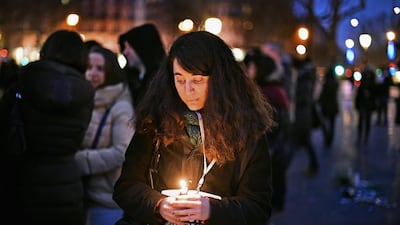19th Arrondissement, Paris // At a brasserie in a largely Arab, working-class district of north-eastern Paris, patrons sip coffee and pick at their lunch as they discuss the recent terrorist attacks that claimed 17 victims.
“We are all waiting — we are all worried,” says Mohammed Kossai, a 23-year-old cashier who is French and of Tunisian origin. “It is terrible what has happened in this country. It is time now that France is united.”
His sentiment is echoed in the windows of cafes, kebab shops and halal butchers across predominantly Muslim neighbourhoods of Paris, where signs hang with the message: “Je suis Charlie.”
French Muslims in the capital say they feel part of the strong sense of national unity sweeping the country, as well as anxiety over further attacks on their home soil. But they are also wary of an anti-Muslim backlash, as right-wing politicians declare that the country is “at war” with fundamentalism.
The three days of violence that ended on Friday when French security forces shot dead the two brothers Cherif and Said Kourachi, who were behind Wednesday's attack at the French magazine Charlie Hebdo in Paris that killed 12.
At the same time, their associate Amedy Coulibaly, who was holding hostages at a Kosher supermarket in Paris was also killed. Four hostages died in the siege of the shop and Coulibaly had also been involved in an attack that killed a woman police officer on Wednesday.
The threat of another attack by home-grown terror cells looms over France, which remains on its highest antiterror warning level.
Despite those fears, hundreds of thousands of people are expected to march in the city’s Place de Republique on Sunday. Among them will be French president Francois Hollande, UK prime minister David Cameron and the German Chancellor Angela Merkel.
Mr Kossai also says he will take part, in the same way many Muslims have participated in the vigils since the attack on the magazine offices.
That sense of unity, however has been strained by at least 15 attacks on mosques in France, says Houria Bouteldja, founder of the Party of the Indigenous of the Republic, an activist group for French residents of African and Arab backgrounds.
“There are a lot of Muslim people on the streets who are being physically attacked, and the mood right now is fear and that there is a threat to Muslims in France,” she says.
Ms Bouteldja says she is also afraid that the community will become a target not only for individuals, but by political parties like the National Front, which will now seek to scrutinise the actions of Muslims.
“This tragedy, which is criminal, will leave us now to think about what progressives and Muslims can do in terms of a real political solution, rather than to become trapped in the agenda of these political forces,” she says.
Chief among all Parisians’ minds are concerns that a terror cell the attackers belonged to, thought to have been dismantled a decade ago, may have remained active.
Al Qaeda in the Arabian Peninsula has told some news outlets that it directed the attack against the French magazine in Paris, which has long drawn threats for its depictions of Islam and the Prophet Mohammed.
US officials say at least one of the Kouachi brothers — French-born sons of Algerian parents — had travelled to Yemen to receive training from the group.
Just before they were killed by police, the attackers told the French news channel BFMTV that they were loyal to radical networks in the Middle East. Kouachi told the station they had been financed by the Yemen-based branch of Al Qaeda, while Coulibaly said he had “coordinated” with the Charlie Hebdo killers and was a member of ISIL.
Asma Soltani, a French Tunisian medical student who works with the global NGO Initiatives of Change to help French Muslims integrate, acknowledged concerns that there could be a terrorist network in France not fully known to authorities, but says she is confident in the French police.
“We need to find the resources to respond in the right way to what has happened — both in France and the Muslim community,” she says. “As Muslims, we need to just go to work and back to our everyday lives and make sure that we remain one with the rest of the French citizens, otherwise it means that these people — who do not represent the Muslim community — win.”
Khaled Salem, who lives in Paris’s 19th arrondissement, is less concerned.
“There are so many Arabs and Muslims in Paris, and it is truly a diverse and accepting society,” he says. “We live here, Muslims and Jews, and others, all together. I am not concerned for my safety. These are my brothers.”
foreign.desk@thenational.ae

